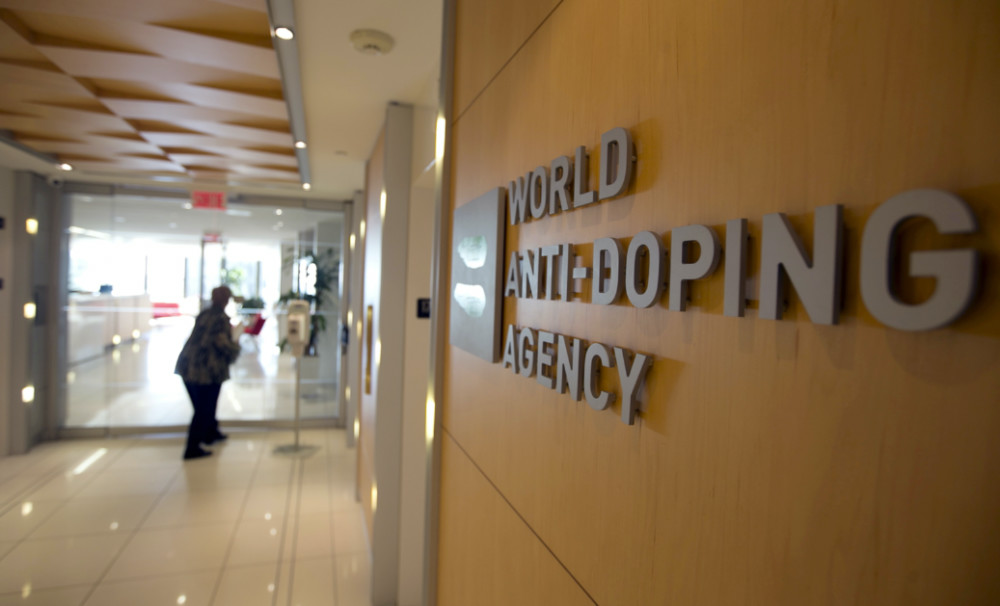Toronto, Canada
Reuters
There may be only a one in a billion chance of failing a doping test due to the COVID-19 vaccine, but some athletes will still resist inoculation, scientists from the World Anti-Doping Agency and the United States Olympic & Paralympic Committee said on Tuesday.
While WADA’s director of sciences and international partnerships Olivier Rabin said the chances of the vaccine leading to a possible doping test failure were so vanishingly small as to be almost non-existent, USOPC medical chief Jon Finnoff said take-up would still not be universal.

A woman walks into the head office of the World Anti-Doping Agency in Montreal, Quebec, Canada, on 9th November, 2015. PICTURE: Reuters/Christinne Muschi/File photo.
Finnoff told Reuters that like any segment of the general public, some athletes would be simply uncomfortable with getting a vaccine shot.
On top of that he said he had fielded more questions about whether the vaccine would hinder performance rather than enhance it.
DICK ROUND WANTS TO EXAMINE REASONS FOR JAPAN PUBLIC’S CONCERNS OVER GAMES
Senior International Olympic Committee member Dick Pound says he wants to examine the reasons behind the Japanese public’s concerns about hosting the Games this summer after recent polls showed around 80 per cent were opposed to the event going ahead in July.
While much of Japan is under a state of emergency due to a third wave of COVID-19 infections, organisers and the government have vowed to forge ahead with preparations for the postponed Games, which are due to run from 23rd July to 8th August.
“I know there are those in Japan who question holding the event,” Pound told the Asahi newspaper in comments published Wednesday in Japanese.
“Together I would like to scrutinise the reasons and respond. Are they are worried about a large number athletes and others from overseas spreading the coronavirus, are they against the cost, or maybe there are people who just don’t like the Olympics.”
Pound also appealed for people to take the feelings of athletes into consideration, noting that they had put in many years of work in order to step onto sport’s biggest stage.
He said the decision on whether the Games go ahead this summer must be made by May at the latest and stressed that another delay was not possible.
“Personally, I think it’s possible to hold the Games this summer,” Pound said. “Several vaccines have been developed and people in the world are being vaccinated. The risk of coronavirus infection can be reduced.”
– CHRIS GALLAGHER, Reuters
“I have not had any athlete raise a concern specifically with me about whether the vaccines can cause a positive [doping] test,” Finnoff told Reuters.
“But I have had athletes raise concerns about are there any long term ramifications associated with it, if I have the vaccine is there the potential that it will impede my performance?
“Part of what we what we are dealing with at the USOPC is really trying to educate people.
“There will likely be a mix of people who want the vaccine and a small percentage who do not.”
WADA maintains athletes should have no hesitation in taking the vaccine with all research and data showing inoculation will have absolutely no impact on performance.
Rabin told Reuters he could not give a 100 per cent guarantee that the vaccine would not lead to a positive doping test but that the probability was next to zero.
“Just imagine theoretically it is one chance out of a million or one billion,” said Rabin. “We all agree there is absolutely no risk vis-a-vis anti-doping.
“When people ask me are you 100% sure my answer is I am fairly certain, I am 99.9 per cent sure but I am not 100 per cent sure.
“It is super, super low risk even probably a non-existent risk.”
Not impact performance
Rabin was even more certain that COVID-19 vaccines would not impact performance negatively, unless taken in the days immediately ahead of competition, when any inoculation can produce minor side effects.
“You receive a vaccination and you develop a little bit of fever, shivers, you don’t feel well. That can happen and that is normal for a lot of vaccines,” explained Rabin. “Like any vaccines it would be very temporary.
“I can understand an athlete saying ‘Look I am 48 hours away from a major competition is it a good time to get the vaccine?’ I would say unless you really have to, maybe it is better to postpone by 48 or 72 hours in case you experience minor side effects.”
While the International Olympic Committee has said athletes would not be forced to get COVID-19 vaccinations ahead of the Tokyo Games, president Thomas Bach indicated they should as a “demonstration of solidarity” with the Japanese hosts.
The USOPC has yet to issue an official policy and is aware of the IOC’s position, but Finnoff’s opinion is that athletes should get a vaccine if possible, a stance echoed by WADA ahead of the 23rd July to 8th August Games.
Finnoff said US athletes will not be jumping any queues to get a shot, but the USOPC might consider purchasing vaccines when they become available to the general public.
“We are definitely investigating every potential opportunity for vaccinating our athletes when it is appropriately available to the general population,” said Finnoff.
Rabin and Finnoff expressed overwhelming confidence in the vaccines, but there are other concerns around the mutations and variants to the virus that are surfacing.
“Certainly what gives us concerns is the mutation of viruses and whether there will be further mutations that lead to variants that are not only highly contagious but potentially more deadly and not prevented by our current vaccinations,” said Finnoff.
“We just don’t know where we are going to be in the next six to nine months going from the beginning of the Games to the end of Games.”





